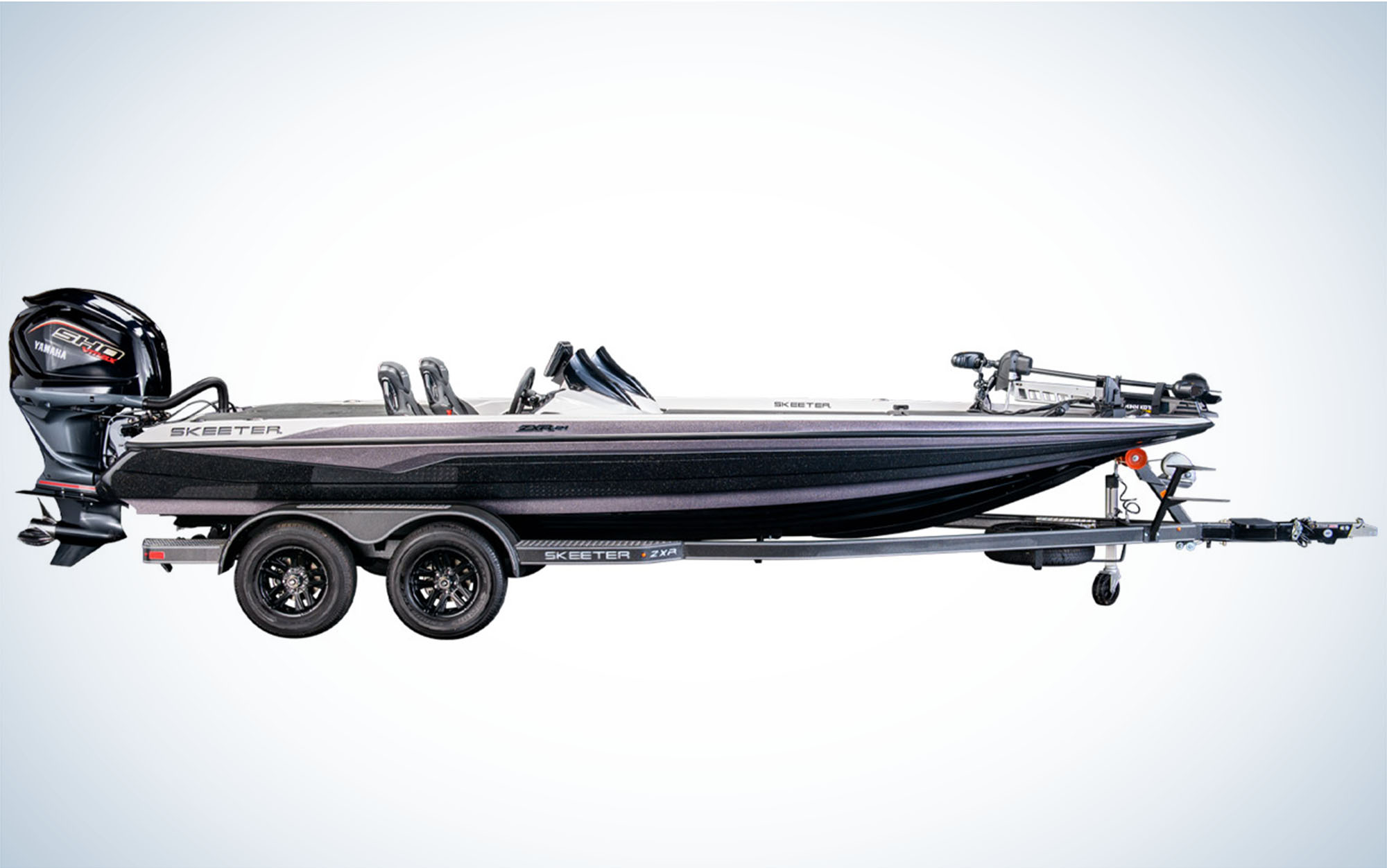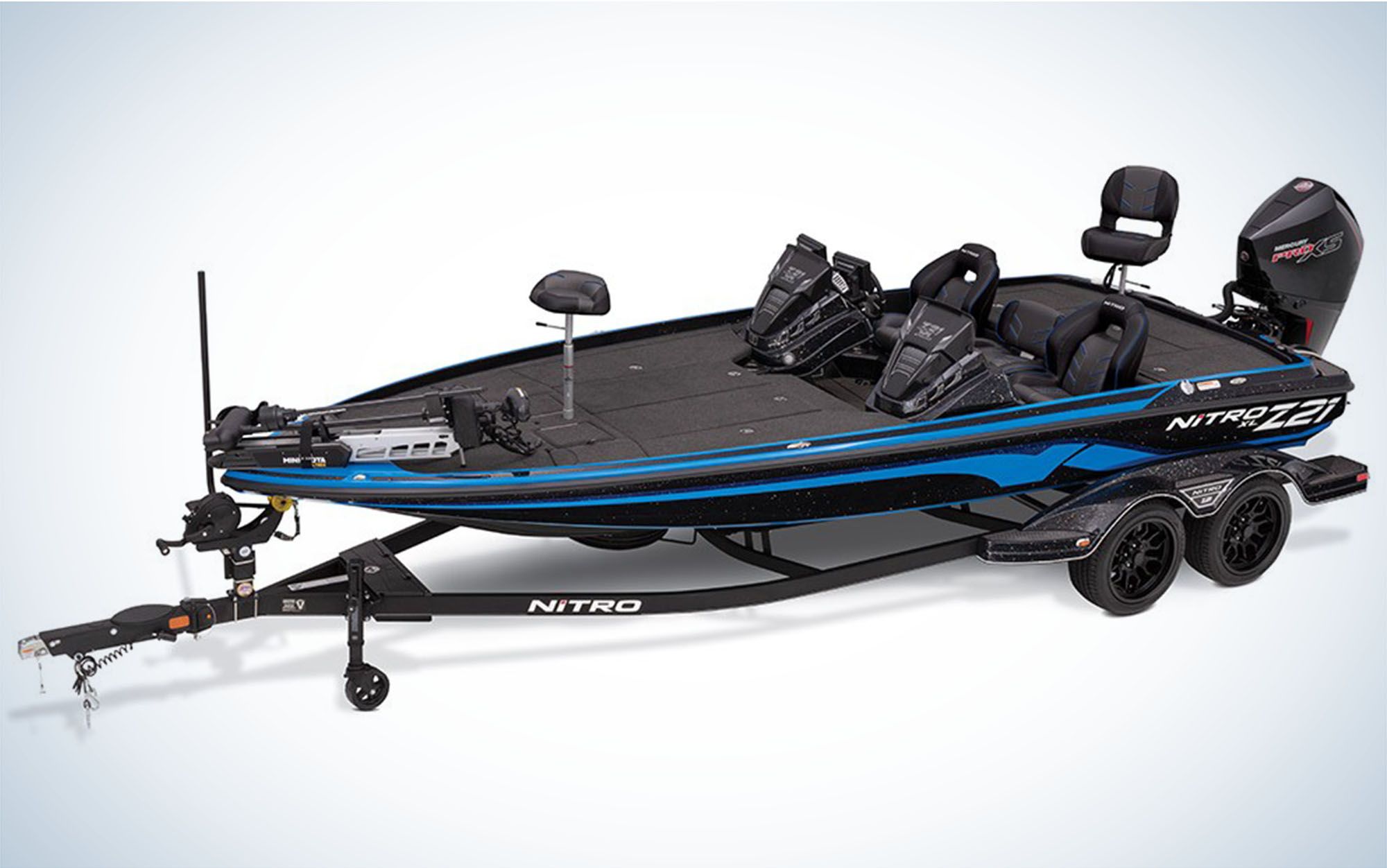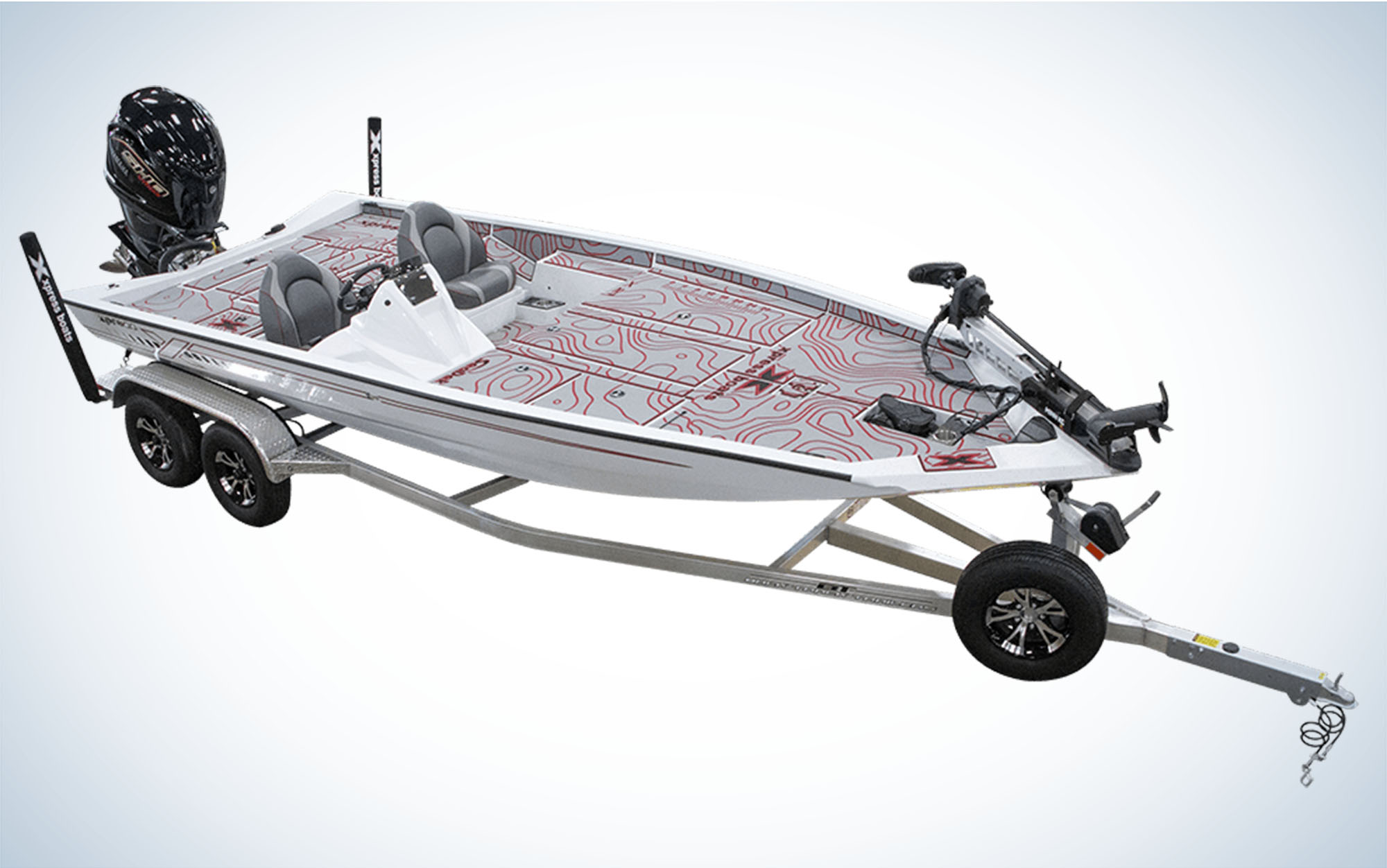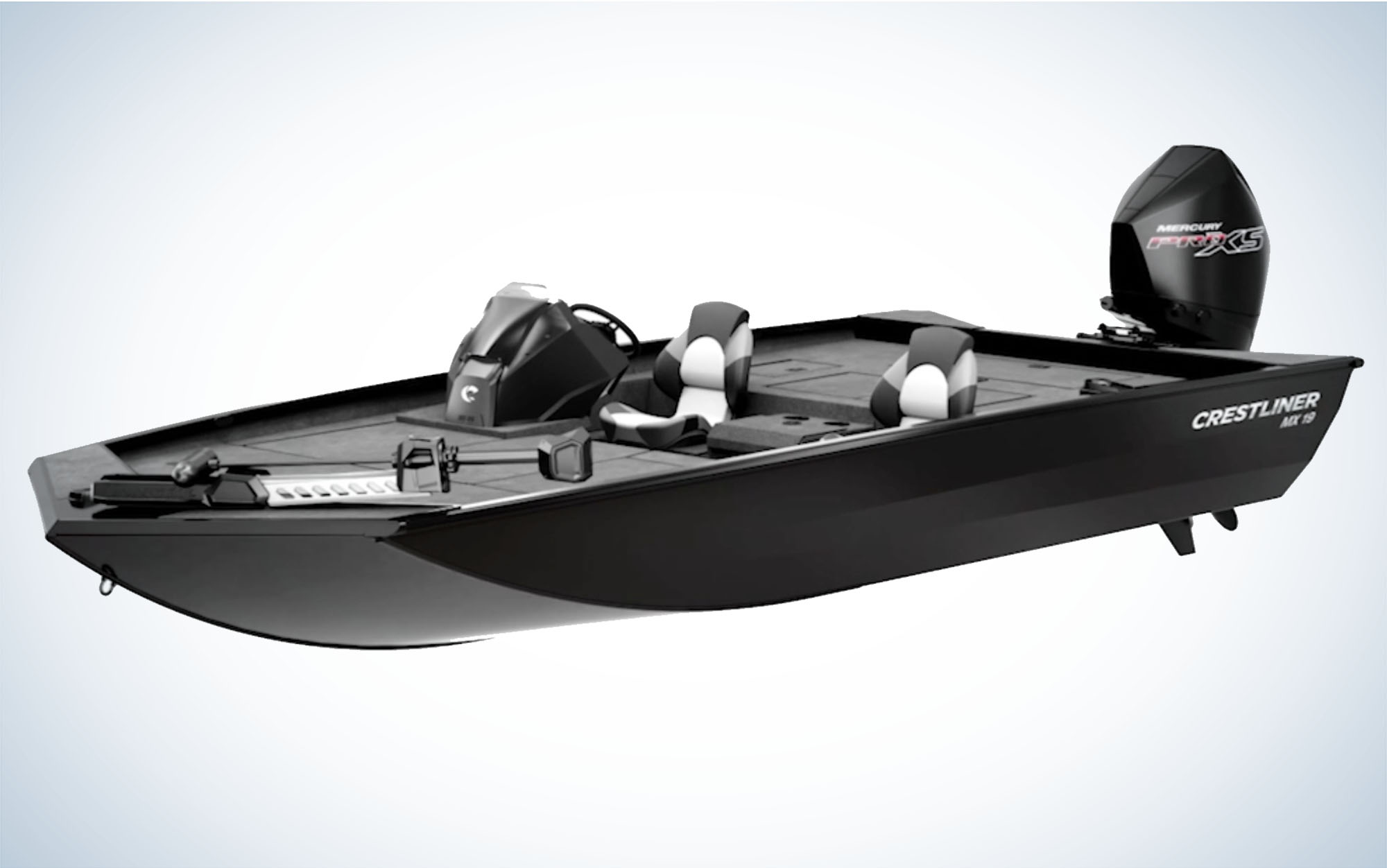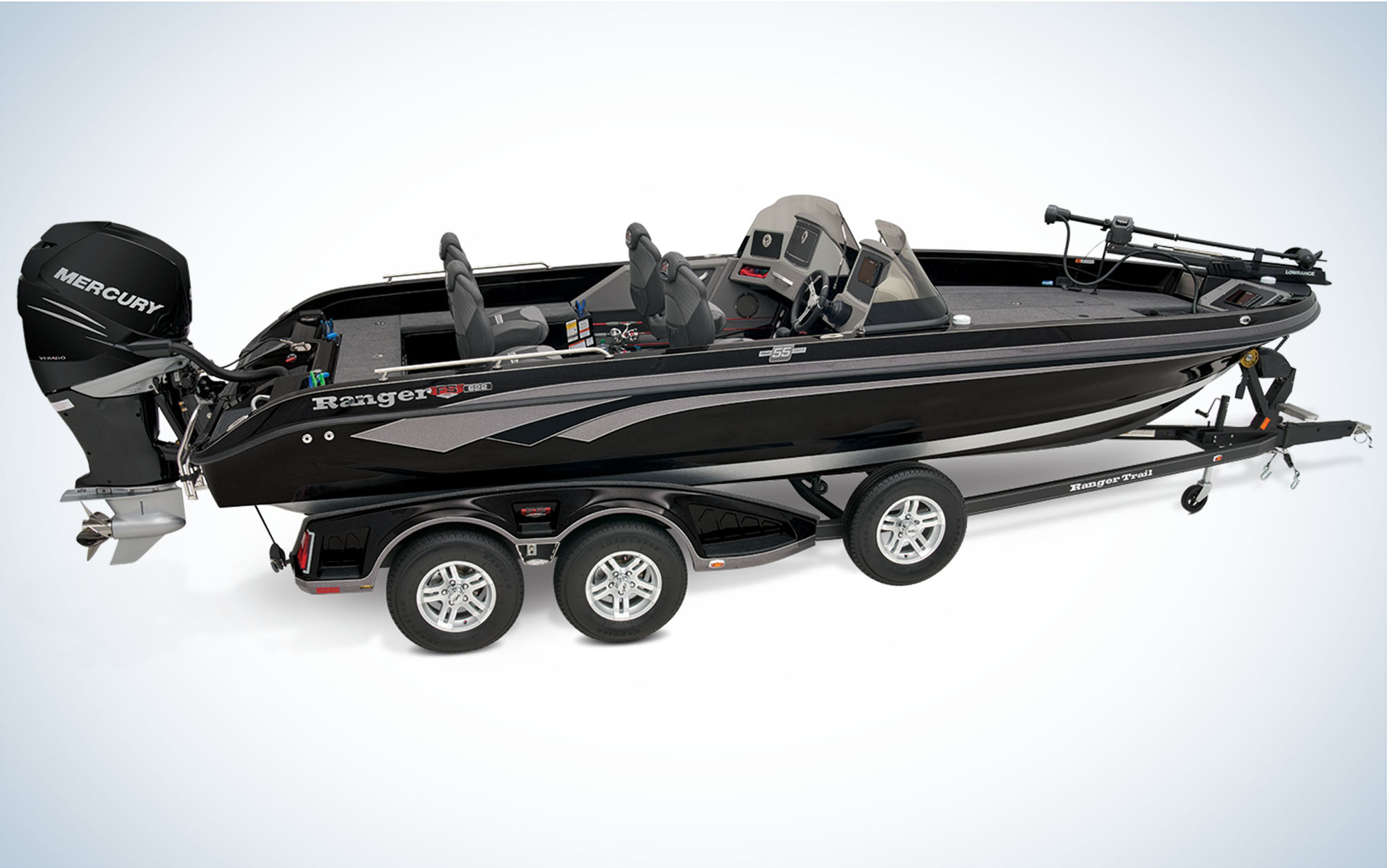We may earn revenue from the products available on this page and participate in affiliate programs. Learn More ›
Published Jun 8, 2023 5:00 PM
The bass boat market has exploded with choices in recent years, but the best bass boat for any particular angler depends on fishing location, budget, and the need to accessorize. Anglers in their 20s may be content to take a pounding in a smaller boat, but as they get older, most come to value the comfort of a larger boat. As they move into retirement, though, and away from competition, it’s often wise to consider an easily-towed aluminum model.
Of course, price is a big factor in anyone’s choice. While it’s easy to covet the 21-foot glittermobile, not everyone can conscientiously make the payments on a luxury that now often exceeds $70,000, $80,000, or even $100,000. Figure out what you can afford—factoring in operational costs, insurance, and maintenance—along with the accessories you’ll want or need, and that should inform your choice.
How We Chose the Best Bass Boats
Over the years, we’ve been in every major brand of boat, and on every type of water, from the swampy oxbows of the lower Mississippi to the ocean-like expanses of Lake Erie. The wrong boat in the wrong place can be miserable, but the right boat will make you feel like you are one with the water. That’s not a one-size-fits-all process, but since most of us can only have one watercraft, we need to figure out which one does the most things well, given our personalized scenarios.
Best Bass Boats: Reviews & Recommendations
Best Tournament Boat: Bass Cat Puma STS
Key Features
- Length: 20 feet 7 inches
- Weight: 2,100 pounds
- Max HP: 300
- Fuel Capacity: 60 gallons
- Prices vary with options, but are around $80,000 to $110,000
Pros
- Easily goes over 70mph with a 250hp outboard
- Massive storage compartments
- Wave Crusher seats add to the comfort
Cons
- Won’t fit in many garages
Bass Cat’s flagship Jaguar is the envy of the bass boat industry, but it performs best with a motor too large for most tournaments. The company took the same “soft touch” concept to the new Puma’s hull, packaging it in a product that is blazing fast with a 250hp motor, meaning it’ll pass most boats at takeoff, yet remains remarkably fuel efficient.
Most importantly, it’s a wave killer with sports car characteristics, made to take on everything from narrow tidal creeks up to the Great Lakes. Of course, it features the recessed trolling motor pedal that Bass Cat pioneered decades ago. Still, it also has new features like optional Reflex flooring, triangular livewell doors, and even a safety ladder if you go in the drink. It’ll hit 75 mph with a full tournament load—it even looks fast on the trailer.
Best Packaged Tournament Boat: Skeeter ZXR19
Key Features
- Length: 19 feet 10 inches
- Weight: 2100 pounds
- Max HP: 225hp
- Fuel Capacity: 44 gallons
- Price: $67,295
Pros
- Comes rigged and ready for action, with solid accessories
- Limited lifetime warranty
- Eight Color Options
Cons
- Limited choices for customization
As prices have risen in the bass boat world, due partially to the cost of materials and partially to the expensive accessories all anglers seem to want, many tournament-grade boats have surpassed six figures. That prices out many would-be competitors who think that they need the latest and greatest to have a shot to win. Through their partnership with Yamaha and other vendors, Skeeter has managed to put together a boat that is fast and solid in the water at a below-market price. It’s still not “cheap” by any means, but compared to its in-class competition, it’s a bargain. They offer eight different color options, from vibrant to subtle, a dual axle trailer, and top-tier electronics, all of which takes away any excuses.
Best Starter Fiberglass Boat: Nitro Z17
Key Features
- Length: 17 feet 4 inches
- Weight: 1,100 pounds
- Max HP: 115hp
- Fuel Capacity: 24 gallons
- Price: $33,995
Pros
- Lots of storage, including a center rod organizer that holds rods up to 7 feet 6 inches
- Aerated, timed livewell
- Can be towed with smaller vehicles than 19- and 20-foot bass boats
Cons
- In this price range, getting a bigger boat in aluminum or in the used market might be possible.
Nitro pioneered the concept of packaged bass boats instead of a la carte building, and Bass Pro Shops’ economy of scale allows them to offer a wide range of options at reasonable prices. They’re one of the few manufacturers that continues to make a 17-foot fiberglass boat, and for those looking only to purchase new and feel that they have to own glass, this is a solid choice. It will handle comfortably in all but the biggest water yet doesn’t need a full-sized pickup or SUV to pull it. There’s a no-haggle, national pricing setup, and while it comes with a full range of accessories, there are options to upgrade or change them to fit your particular angling style and needs.
Best Large Aluminum Boat: Xpress X21 Pro
Key Features
- Length: 21 feet
- Weight: 1,580 pounds
- Max HP: 250hp
- Fuel Capacity: 40 gallons
- Price: $43,995
Pros
- Great fuel efficiency
- Tows more easily than other 21-foot boats
- Shallower draft than comparable fiberglass boats
Cons
- While the price is less than many fiberglass boats, once fully accessorized, it’s not “cheap” by any means
While fiberglass boat construction has long been the aspirational standard for tournament anglers just about everywhere, in recent years, many of the top pros have realized the value of aluminum. Simply put, they can run the larger “tin” boats in big water yet also get them into nasty untouched backwaters. As competition has gotten tougher and anglers have gotten more advanced, that’s a huge benefit. Xpress is the choice of several top pros—in fact, Jason Christie won the Bassmaster Classic out of one. It’s rated for up to 250 hp, has massive storage and large live wells, and you can even outfit it with SeaDek flooring, which easily hoses off in anticipation of another day of mud-bogging and check cashing.
Best Bargain Aluminum Boat: Crestliner 1700 Ridge
Key Features
- Length: 16 feet 11 inches
- Weight: 985 pounds
- Max HP: 75 hp
- Fuel Capacity: 21 gallons
- Starting Price: $20,572
Pros
- All-welded aluminum construction
- Easy to tow with smaller vehicles
- Carpeted interior
Cons
Crestliner has a well-earned reputation for making boats throughout all segments of the spectrum, from bare-bones jon boats up to the Bassmaster tournament-ready models used by anglers like perennial Classic contender John Cox. This one splits that difference and includes features like an aerated livewell, lockable storage, and carpeted interior while also maintaining the best aspects of the least expensive boats—in other words, it’s easy to tow, easy to store, and won’t break the bank. While it’s comparatively inexpensive, the company has taken great pains to make sure that it’ll last a lifetime, including all-welded construction along with an interior protective coating. Whether you’re headed into the creeks of a river or launching on a larger impoundment, this boat can be built to your specifications, as simple or advanced as you need it to be.
Best for Big Water: Ranger 622FS PRO
Key Features
- Length: 22 feet 10 inches
- Weight: 2,650 pounds
- Max HP: 400 hp
- Fuel Capacity: 56 gallons
- Price: $110,995
Pros
- Massive front deck
- 22-foot, 10-inch length and 102-inch beam span big swells
- Holds rods up to 9 feet
Cons
While the Ranger 622FS is constructed in the traditional “walleye” or “multispecies” Deep V style, increasingly bass anglers on big waters—including, but not limited to, the Great Lakes—are embracing this style to ensure that they can get to their fish and get back with everyone in one piece. This is Ranger’s flagship, with all sorts of high-end goodies packed in. Those include a multifunction display that enables control of everything through a single touch screen, as well as lithium batteries, trim tabs, and a trailer meant to easily haul this aircraft carrier. Yes, a regular bass boat can handle the biggest waves when piloted by an experienced driver, but to be honest it won’t be fun. This makes it a more comfortable ride, and you’ll do it in style.
Read Next: The Best Fish Finders of 2023
Things to Consider Before Buying the Best Bass Boat
Storage
Being an efficient angler means having your gear organized and at your fingertips – and locked away at a hotel or gas station. If you use 8-foot rods and your boat won’t store them properly, that’s a disadvantage. Some anglers bring a “Tennessee tackle box” (brown paper bag full of jigs), and others like to carry an entire tackle shop. Figure out which you are and plan accordingly.
Towing
The biggest boats may provide the most comfortable ride, but they can be a bear to tow. Many require a V8 vehicle or a powerful diesel for safety. Furthermore, even if you have the right tow vehicle, in an era of increasing gas prices, a heavy boat can make a trip to the lake quite expensive.
Cost
Many of today’s “top” boats push well past $100 grand at retail, driven partially but not entirely by the ability to accessorize to the moon. Even anglers who can afford that cost out of pocket may have trouble with the additional need to insure and maintain these dream boats.
Accessories
Between shallow water anchors, hydraulic jack plates, mapping, and both forward-facing and side-imaging sonar, it’s possible to drive up the base price by tens of thousands before you leave the lot. Some anglers put four or even five screens on their boats. Determine what you need, and if budget is a factor, determine whether you’ll benefit more from additional high-end accessories or a bigger, more expensive boat. Choose wisely.
Read Next: The Best Trolling Motors of 2023
FAQs
Q: What bass boats do the pros use?
Most pro circuits are limited to 250hp motors, so the “standard” for top pros has become a 20- or 21-foot fiberglass boat with exactly that power plant. In recent years, however, more of them have embraced aluminum models as a way to get away from the crowd and increase fuel efficiency without giving up much, if anything, in “normal” scenarios.
Q: Can bass boats go in saltwater?
Some “bass and bay” boats are made for fresh and saltwater applications. Generally, they have bass boat styling with no carpeting, corrosion-resistant features, and galvanized aluminum trailers. Some of these features can be added on to standard bass boats. If you take a bass boat into saltwater, be sure to hose down any potential corrosion points after use.
Q: Which bass boat is best in rough water?
Generally, larger is better when it comes to rough water, and a deeper hull will break down the big waves better. Much of it comes down to driving, though. A smaller boat in the hands of an experienced and cautious driver may provide a more comfortable ride than someone in a larger boat who doesn’t know when to take his or her foot off the pedal.
Read Next: The Best Boat Covers of 2023
Why Trust Outdoor Life?
Since 1898, OL has been a leading authority in testing and reviewing hunting gear, fishing tackle, guns and shooting equipment, and much more. We have more than a century-long history of evaluating products, and we’re now bringing that expertise to online reviews. Our editors are experienced outdoorsmen and women, and most importantly, we’re trained journalists. We prioritize field testing and objective data when reviewing products. We conduct interviews with gear manufacturers and engineers as well as outdoor experts so that our readers have an understanding of how and why a product works—or doesn’t.
Advertising does not influence our gear reviews and it never will. While we always focus our coverage on standout products—because we want our readers to be aware of the latest and greatest gear—we also cover the flaws and quirks of any given product.
Final Thoughts
Picking a bass boat is like picking a spouse—everyone has different tastes and different needs. The process comes down to various factors, starting with the waters you’ll fish. What works best on the Great Lakes might be a hindrance in the shallow backwaters of an obstruction-laden river. More features and styles are available than ever, but they come at a cost, and budget is also a prime driver of all decisions.

